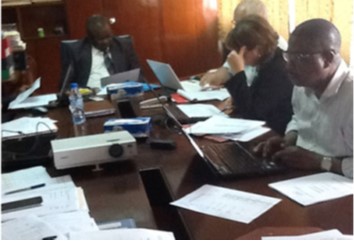Decentralization Secretariat on orientation program for MDAs
Freetown, July 18 (SLENA) – The Decentralization Service Delivery Program (DSDP) (Dec-Sec) last week Tuesday conducted an orientation programme for representatives of Ministries, Departments and Agencies (MDAs) on the Grievance Redress Mechanism (GRM) at the Ocean View Hotel, Aberdeen in Freetown.
The focal point for the GRM is the Monitoring and Evaluation Department at Dec-Sec, 9th Floor, Youyi Building in Freetown.
The World Bank is advocating for a standardized GRM for all other MDAs to plug in.
Some of the types of grievances are non-availability of resources, incomplete and stalled projects, the none-involvement of stakeholders in project implementation, poor quality work/performance, attitude of staff in the management and implementation of projects.
Others are land disputes, encroachment and those ranging from the environment to procurement.
Mr. Jonathan Kpakiwa, Capacity Building Manager, Decentralization Secretariat said GRM would enhance transparency and accountability in the implementation of projects in addition to addressing the concerns of beneficiaries and project implementers.
He also informed that this is one of the series of workshops to be organized; that the GRM is a pilot project for five Local Councils and that the workshop is to sensitize participants about their role in the process. He also spoke about the GRM structures, channels and types of grievances, noting that not all complaints would be accepted and implored participants to make salient inputs into the process.
Colina Macauley, Monitoring and Evaluation Manager, Dec-Sec, disclosed that the GRM would be implemented in the Ministries of Health and Sanitation, Education, Science and Technology, Water Resources, Social Welfare, Gender and Children’s Affairs and Waste Management.
She continued that the GRM would be implemented in three levels: Ward, Local Councils and National or Project, adding that it is the responsibility of Local Councils to constitute the Committees, mobilize the people and inform them about the process, adding that complex issues that cannot be addressed by GRM would be referred to the appropriate authorities such as the Anti-Corruption Commission (ACC) and the Office of the Ombudsman but clarified that the GRM would not address corruption issues.
She furthered that the various levels of the GRM Committees would investigate and verify complaints within seven days, maintain confidentiality of complainants, submit monthly reports assuring that action would be taken to address complaints in a timely manner and that complaints would be inputted into a database.
Colina Macauley also informed that Sierra Leone is a fragile state and recalled in the past when people did not have means to seek redress with Local Councils not having any formal system to address grievances and for services to reach the people.
Sallay Kakay, also of the Monitoring and Evaluation Department, Dec-Sec, articulated that the GRM is a credible process to address grievances, serves as an early warning system, builds trust within communities, receives timely feedbacks from beneficiaries and disclosed plans to position suggestion boxes nationwide for people to put their complaints in addition to email, text messages and phone calls.
According to Sallay Kakay, the GRM manual is user-friendly, that Chairmen and Mayors of Local Councils have been orientated on the process in Bo with plans to orientate other key stakeholders while communication materials have been developed.
The GRM will commence this August lasting three months with the following Local Councils: Kono, Freetown, Kambia, Tonkolili and Bonthe to be later scaled-up in all Local Councils.
The criteria to select the five pilot districts is based on their geographical scope, size, performance, weakness, remoteness and Best Council as in the 2013 Performance of Councils, Tonkolili emerged first while Kono recorded rapid fall in performance.
Abdul Karim Kanu, Dandison Smith and Mbalu Kamara made presentations on the GRM Forms, Communication Materials and Branding of GRM as well as Expected Complaints to be handled under the System Outcomes, respectively.
Discussions on communication materials, branding of GRM (logo and Local name) and the question and answer session climaxed the well-attended workshop.
The Decentralized Service Delivery Program (DSDP) has designed a Grievance Redress Mechanism (GRM) as part of its social accountability drive to promote meaningful participation of citizens in the decentralization process and to hold leadership of the Local Councils accountable, especially in the delivery of services to their localities.
Credit SLENA
Stay with Sierra Express Media, for your trusted place in news!
© 2015, https:. All rights reserved.






